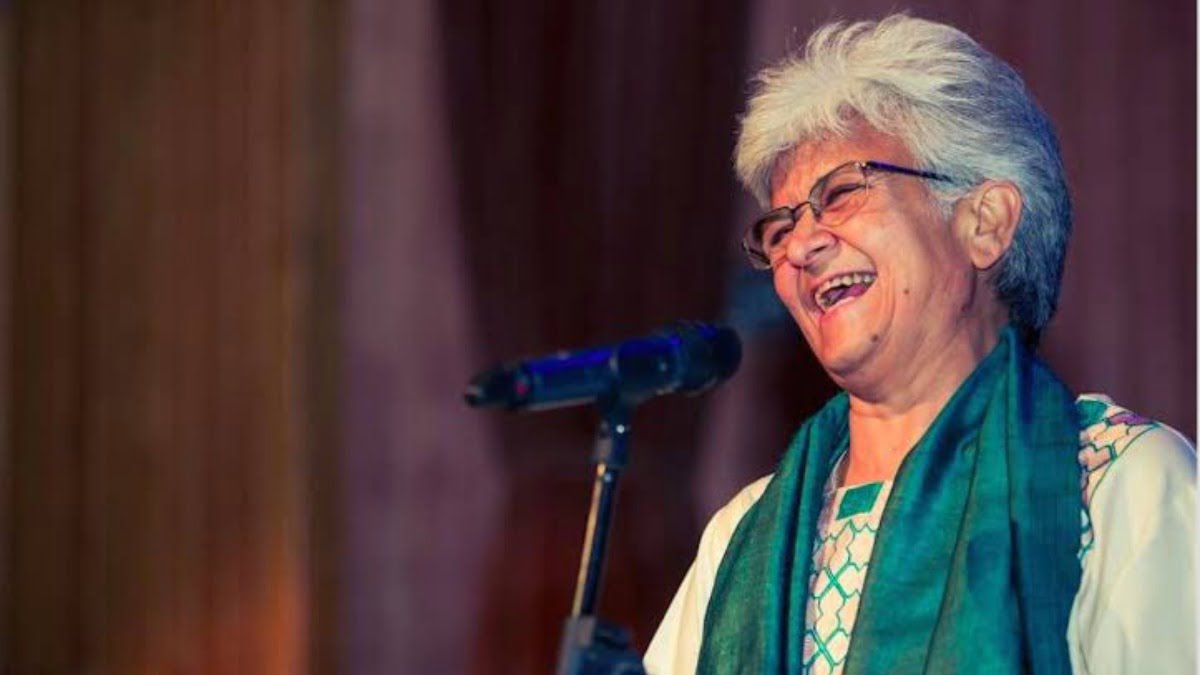Kai zor-zulm se bachna hai so padhna hai
Kamla Bhasin, Kyonki mai ladki hoon mujhe padhna ha
(I want to study to protect myself from atrocities)
Kai kaanunon ko parakhna hai so padhna hai
(I want to study to be aware of and analyze laws)
Mujhe naye dharmon ko rachna hai so padhna hai
(I want to study to create new religions)
Mujhe sab kuch hi toh badalna hai so padhna hai
(I want to study to change each and everything)
Kyonki mai ladki hoon mujhe padhna hai
(I want to study because I am a girl)
In times when we helplessly watch women’s rights, human rights and democracy being trampled in Afghanistan, the demise of Kamla Bhasin (1946-2021) comes as a devastating blow. She was perhaps the first feminist that we contemporary students of social sciences came across. Be it her short works on gender, children’s books, poems, TEDx talks, writings or activism, Kamla di dedicated her life to the cause of gender equality. She strived to create a better, equal and free world for girls and women – one which was not filled with the misogyny of patriarchy but love and respect that came along with equality.
Her lifelong association with the women’s movement and active engagement with feminist networks and campaigns such as Sangat, Jagori, and One Billion Rising made her a feminist icon across South Asia. She continues to be revered by the young and old alike for her fearless feminism. None can deny that she was a feminist through and through, in thought, word, and deed. She made a place in all our hearts with her indefatigable efforts towards feminist conscientization by resisting patriarchy. She chose art as a form of protest and resistance, using songs, poems, posters and plays to spread the messages of equality, freedom, justice, and love. Instead of deploying jargon and complex academic theories, she sought to make her ideas and ideology intelligible to everybody through creative modes of expression. Her strength lay in her courage to be different and stand up for what was right. In doing so, she became our role model and inspiration who personified that the ‘personal is political’.
Kamla di was among the most dynamic and vocal critiques of patriarchy and gender-based violence of our times, much the likes of Maya Angelou and Gloria Steinem. One of her most prominent arguments is how patriarchy adversely affects men too by dehumanizing them. She spearheaded the campaign against violence and abuse meted out to women, asserting that women’s honour does not lie in their vaginas. She continued to lead from the front, marching along with everyone else demanding justice, safety, and equal rights for women. She taught us that feminism is for everybody. She awakened our sleepy conscience and made us think, question, dance, sing, and laugh. But most importantly, she made us believe in ourselves, our dreams and futures. She leaves behind a legacy of sustained resistance, determination, strong will-power, and resilience in the fight against patriarchy and the journey towards a world where women can be themselves.
Also read: Kamla Bhasin: On Feminism in Pakistan and India
I consider myself fortunate to have met her two years ago at Jagori Grameen situated at Kangra, Himachal Pradesh. I was struck by her remarkable strength and resilience despite a challenging life full of personal setbacks. Without any trace of pride or arrogance, she asked us to address her as didi (sister) instead of ma’am. She allowed neither age nor personal troubles to sap her energy. Back then at seventy-three, she radiated an aura of youthful enthusiasm, positive energy, and a sense of purpose. She has been a perennial source of inspiration for scores of young women like me who learnt the ABC of gender and feminism through her writings.
Thank you, Kamla di, for showing us the way towards a feminist future. You will always be remembered for your grit, ideas, activism, and the life that you bravely led despite the odds. You were not unnerved by challenges, rather faced them with a clear conscience and your head held high. You led by example and illustrated that it was human to make mistakes and apologize. You stressed the importance of our education, independence, autonomy and freedom – that we could do and be all that we wanted to be. You made us realize that change was possible, it began at home, and that we could break free from the shackles that bound us. You left your mark in the women’s movement, in the world, and in all our hearts.
The task ahead of us is to continue to strive for what Kamla di stood for. Democracy, freedom, development, secularism and gender equality are ongoing projects for which each of us ought to positively contribute to make a difference. Let us educate, empower and emancipate ourselves from the bondages of patriarchy, ignorance, prejudice, indifference, violence and hatred. Let us strengthen our bonds of sisterhood and solidarity; uphold the ethics of care, and treat one another with kindness, empathy, and respect. Let us rise together by lifting others.
Rest in power, Kamla di!
Also read: The Need For Radical Love In Social Justice & Human Rights Work
Aishwarya Bhuta is a social scientist in the making who writes on issues of socio-economic relevance. She holds an MA in Development and Labour Studies from Jawaharlal Nehru University.




